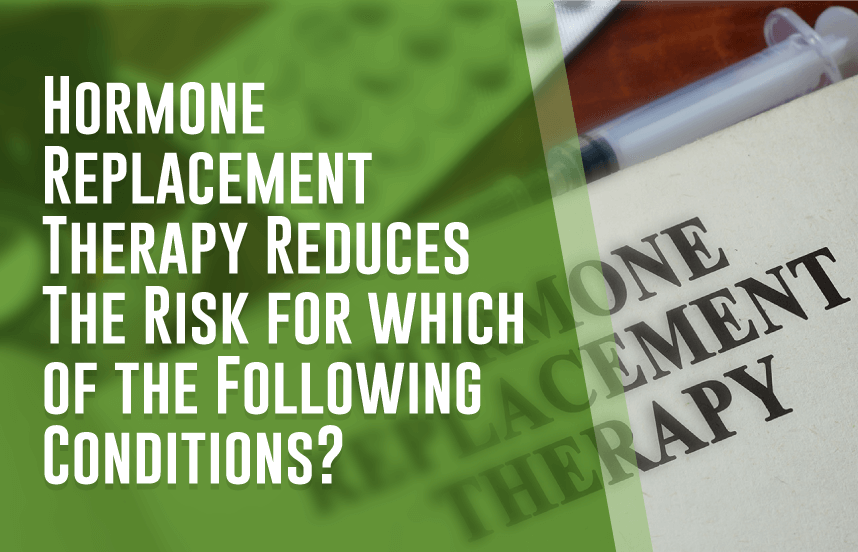
Hormone replacement therapy (HRT) is a treatment used to relieve symptoms of menopause. The primary purpose of HRT is to replace the hormones that the ovaries no longer produce after menopause. This therapy can be taken in pill form, as a patch, gel, or cream.
HTR has been very popular and prescribed to millions of women over the years, and its benefits have been well publicized. HRT remains an effective treatment option for many women suffering from menopausal symptoms. When used correctly, hormone replacement therapy can relieve symptoms and reduce the risk for certain conditions. This article will discuss some of the benefits of Hormone Replacement Therapy.
Benefits of Hormone Replacement Therapy
Osteoporosis
Osteoporosis is a condition characterized by thinning of the bones and an increased risk for fractures. After menopause, women lose bone mass at a faster rate due to the decreased production of estrogen. Hormone replacement therapy can help prevent this bone loss by supplying the body with estrogen. This can help reduce the risk of osteoporosis and improve bone density.
Heart Disease
Heart disease is the leading cause of death in women in the United States. After menopause, women’s risk for heart disease increases due to the decline in estrogen levels. Estrogen helps to keep cholesterol levels in check and also has a protective effect on the lining of the arteries. Hormone replacement therapy can help lower cholesterol levels and protect against the hardening of the arteries, reducing the risk of heart disease.
Colorectal Cancer
Colorectal cancer is the third most common cancer in women in the United States. The risk for this type of cancer increases after menopause, likely due to the decline in estrogen levels. Hormone replacement therapy can help to reduce the risk of colorectal cancer by supplying the body with estrogen. This hormone has a protective effect on the cells of the colon and rectum, which can help to prevent cancer development.
Hot Flashes
Hot flashes are a common symptom of menopause, characterized by a sudden feeling of warmth and often accompanied by sweating. It can be mild or severe and occur at any time of day or night. Hormone replacement therapy can help to reduce the severity and frequency of hot flashes by supplying the body with estrogen. This hormone helps regulate body temperature, easing hot flashes symptoms.
Vaginal Dryness
Vaginal dryness is another common symptom of menopause, characterized by decreased vaginal lubrication. This can cause discomfort during sex and an increased risk of vaginal infections. Hormone replacement therapy can help to increase vaginal lubrication and elasticity by supplying the body with estrogen. This can
Hormone replacement therapy is a treatment that can help to relieve symptoms of menopause and also reduce the risk for certain conditions. If you are experiencing menopausal symptoms, talk to your doctor about whether HRT suits you.
Night Sweats
Night sweats are a common symptom of menopause, characterized by sudden and severe sweats that often occur at night. These sweats can be disruptive to sleep and can cause anxiety and fatigue. Hormone replacement therapy can help reduce night sweats’ severity by supplying the body with estrogen. This hormone helps regulate body temperature, easing hot flashes symptoms.
Weight Gain
Weight gain is a common symptom of menopause caused by a decline in estrogen levels. Estrogen helps to regulate metabolism and fat storage in the body. When levels of this hormone decline, metabolism slows, and fat storage increases, leading to weight gain. Hormone replacement therapy can help to increase metabolism and reduce fat storage, which can help with weight loss.
Mood Swings
Mood swings are a common symptom of menopause, caused by fluctuating hormone levels. Estrogen helps to regulate mood, and when levels of this hormone decline, it can lead to mood swings. Hormone replacement therapy can help to stabilize hormone levels and reduce the severity of mood swings.
Final Thoughts
The benefits of hormone replacement therapy is a treatment that can help to relieve symptoms of menopause and also reduce the risk for certain conditions. If you are experiencing menopausal symptoms, we at Merge Medical Center can help. We can provide you with the care and treatment you need to find relief. Contact us today to schedule an appointment.


